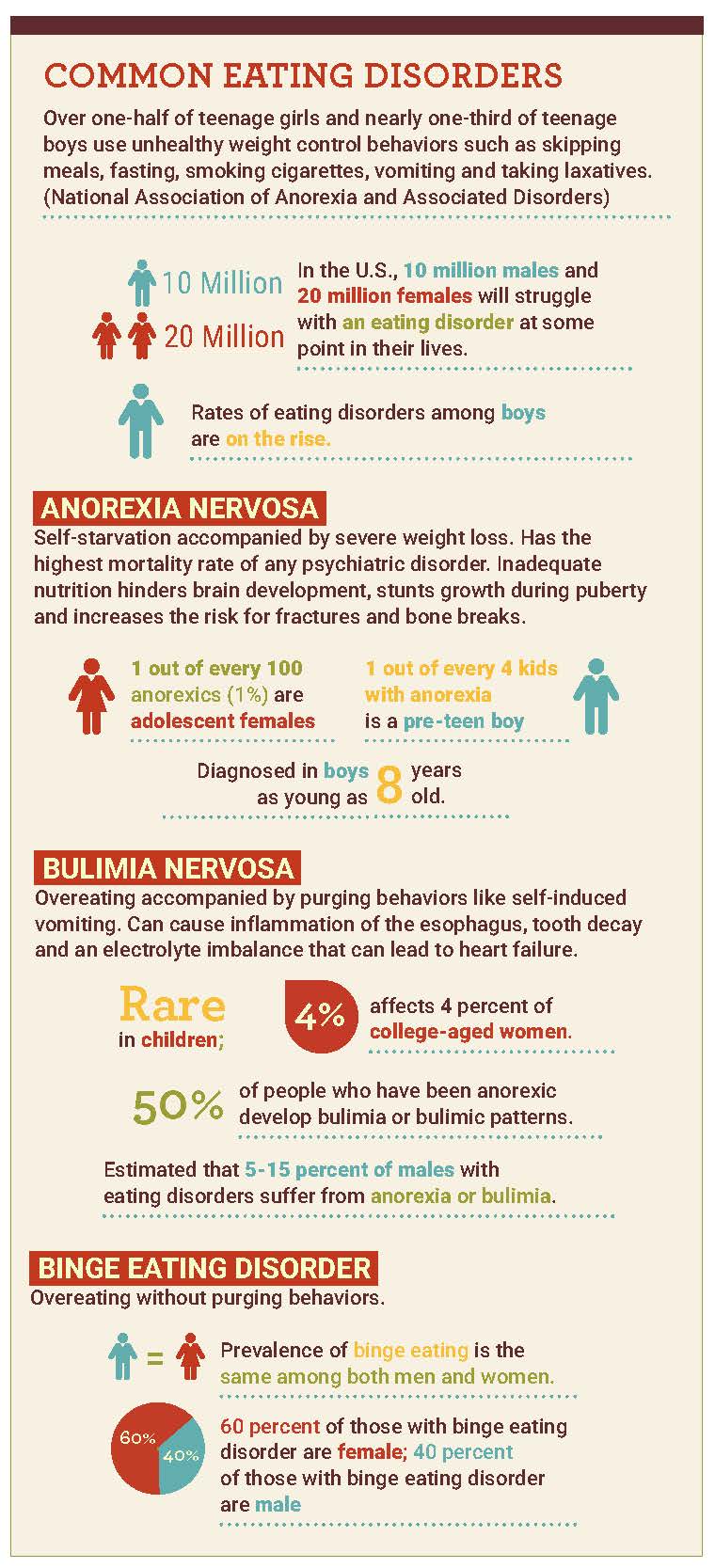Fueled by anxiety and depression, bullying, sports, and feelings of inadequacy in an appearance-driven culture, eating disorders continue to rise among young people. Early intervention is key to successful treatment, but these life-threatening psychiatric conditions aren’t always immediately obvious.

“It’s such a quiet, insidious illness. An eating disorder can go on for a couple of years before friends, parents or teachers figure it out,” says Jennifer Walk, LPC, NCC with Family Living Institute in Williamsburg, Virginia.
Awareness is key.
Parents, teachers and coaches who recognize red flags and role model a healthy lifestyle can make a difference.
“Coaches can be one of the biggest advocates in making sure kids stay healthy by reinforcing how important nutrition is to fuel your body to do the sport accurately andto prevent injuries,” Walk says.
A genderless illness.
Eating disorders are most prevalent among girls, but boys are also at risk. Following a difficult divorce with her son’s father, Jennifer Smith’s 9-year-old son exhibited signs of an eating disorder marked by distressing nightmares about overeating and a fear of gaining weight. With guidance from her son’s pediatrician and a counselor, Smith helped him feel less anxious about food.
“I asserted that I was ‘the mom’ and that as his mom, I was in charge. He needed to listen to me when I told him that he needed to eat and grow and
be healthy.
I promised him I would tell him at any time if I felt he was gaining too much weight. I explained that it was ‘my job’ to watch and judge his health, including his weight,” she says.
Dieting’s slippery slope.
Accompanied by compliments and positive attention, weight loss can turn addictive.
“Most females start off with an ‘innocent’ diet to lose some weight, whereas many males desire to become more muscular and powerful, yet ‘cut’ like a bodybuilder, which is a tricky balance to achieve through nutrition and exercise,” says Crystal Witte, RDN, a registered dietitian at Customized Nutrition Works in Newport News, Virginia.
Avoid discussing your child’s weight or size or comparing her weight to her friends.
“The focus should always be on sustainable lifestyle choices that promote health, yet are realistic,” Witte says. “Children and teens are still growing and developing so body weight is not a reliable way to gauge health.”
Promote open communication.
Cyber-bullying and cruel remarks from peers about appearance can distort a child’s self-image. Monitor your child’s online activity and establish boundaries like powering off devices at bedtime. Most of all, talk and listen to your kids to remain aware of what is happening intheir lives.
“People underestimate how serious eating disorders can really be,” Walk says. “Some parents think it’s just a phase. The longer the behaviors continue, the harder it is to stop.”
Local Resources & Support Groups
Family Living Institute
Williamsburg
757-229-7927
Customized Nutrition Works, LLC
Yorktown
757-652-4268
Genesis Counseling Center
Hampton
757-827-7707
Hampton Roads ANAD Support Group
Newport News
Michael and Mary Southern
757-243-2986
Carolyn Hersh, MA, LPC
Norfolk
757-404-3010
Dominion Psychiatric Associates
Virginia Beach
757-498-9391
Books
- How to Get Your Kid to Eat…But Not Too Much, by Ellyn Satter.
- I’m, Like, So Fat: Helping Your Teen Make Healthy Choices about Eating and Exercise in a Weight-Obsessed World, by Dianne Neumark-Sztainer.
- Help Your Teenager Beat An Eating Disorder, by James Lock and Daniel LeGrange.
Help Lines
National Eating Disorders Association: 1-800-931-2237
National Association of Anorexia and Associated Disorders: 630-577-1330

